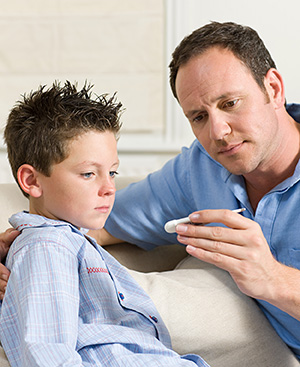Your child has been diagnosed with a liver disease. You’ll need to watch your child for some signs and symptoms of problems. Some of these are common signs of liver disease. For others, you’ll need to call your child’s healthcare provider. And in some cases, you need to take your child to the emergency room.
Signs of chronic liver disease
Some signs often occur in children with ongoing (chronic) liver disease. These are not urgent. They can often be treated during your child’s regular healthcare provider or clinic visits. The signs may include:
-
Broken bones (bone fractures). These can occur more easily when a child has liver disease. This is because liver disease can lead to a decrease in the thickness of bones (bone density). If your child breaks a bone, they need medical care right away. But a fracture doesn’t need to be reported to your child’s liver healthcare provider until the next office visit.
-
Itchy skin. This can occur due to a buildup of bile in the body.
-
Loss of appetite. This can occur due to liver disease. It may lead to the body not getting enough of the nutrients it needs (malnutrition).
-
Pale stools. These can be a sign that the liver is not making or releasing bilirubin, which normally colors the stools. Pale stools can also be due to liver infection or inflammation. The color is a gray or clay color. Pale stools are also called acholic stools.
-
Easy bleeding and bruising. This may happen due to a lack of vitamin K, or if the liver can’t use the vitamin K it has.
A child with chronic liver disease may also have signs of malnutrition. This may occur because the liver isn’t processing nutrients. A child with malnutrition may have:
-
Poor growth or weight loss, because the liver can’t help the body use fat normally
-
Rickets, a disease that causes soft, weak bones (low bone density). Signs of rickets in infants include weakness. Older children may be bowlegged or have ribs that feel very bumpy where they meet the breastbone (sternum).
When to call the healthcare provider
Tell your child’s healthcare provider or clinic as soon as possible if your child has any of these:
-
Jaundice. Signs of jaundice include yellowing of the skin and whites of the eyes, dark urine, or light-colored stool. This occurs due to a buildup of bilirubin. Bilirubin is a yellow substance that’s made when the body breaks down red blood cells. The liver collects bilirubin to be sent out of the body in stool. When something is wrong with the liver or bile ducts, bilirubin may build up in the body.
-
Belly (abdominal) pain. This can be a sign of a liver infection or inflammation.
-
Fever. Call the healthcare provider at the first sign of fever. They will ask you questions to figure out if the fever is due to a liver problem or something else.
-
Abdominal swelling. This can be due to an enlarged liver or spleen. It can also be due to fluid in the abdomen (called ascites). This can be caused by infection or high pressure in the blood vessels feeding the liver.
When to go to the emergency room
Take your child to the emergency room or call
-
Changes in mental status. This can include confusion, delirium, coma, and extreme sleepiness. These changes are due to a buildup of toxins that would normally be processed by the liver. They are signs that the liver isn’t working the way it’s supposed to.
-
Vomiting blood. This is a sign of bleeding in the upper gastrointestinal (GI) tract.
-
Bloody stool. This is a sign of bleeding in the GI tract. Blood in stool may be black and tarry, dark red, or bright red.
Featured in


